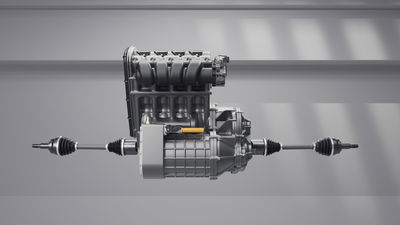Romain Grosjean's 137mph Bahrain Crash Registered 53G
Dr Ian Roberts and F1 Medical Car driver Alan van der Merwe discuss those crucial few seconds following @RGrosjean's crash in Bahrain
— Formula 1 (@F1) November 29, 2020
An amazing response by all involved #BahrainGP 🇧🇭 #F1 pic.twitter.com/oY2TDffBR3
Last weekend’s Bahrain Grand Prix was overshadowed by a huge accident for Romain Grosjean during the first lap of the race. In what is surely the biggest crash F1 has seen in years, the Haas driver clipped AlphaTauri’s Daniil Kvyat, pitching his car into the barrier with enough force for the car to split in half and explode into flames.
Thankfully, marshals were quickly on the scene to fight back the conflagration, with F1 doctor Ian Roberts and medical car driver Alan van der Merwe arriving swiftly to help Grosjean escape the burning wreck.
The moment Grosjean collided with the barriers#BahrainGP 🇧🇭 #F1 pic.twitter.com/VL1lMtRQjR
— Formula 1 (@F1) November 29, 2020
The French-Swiss driver was in the stricken car for around 30 seconds, by which point his helmet had become “completely opaque and melted,” Dr Roberts described. There were fears the French-Swiss driver might have broken some ribs, but X-rays taken at the Bahrain Defence Force Hospital showed no fractures. He was kept in overnight due to sustaining burns to the back of his hands, but in a testament to modern F1 safety, Grosjean was otherwise uninjured.
The 34-year-old credited the Halo for saving his life After Bahrain, we should think all criticism of these once-controversial safety devices will vanish. There are some concerns over how the safety cell of Grosjean’s car was able to penetrate the barrier, though. “The angle must have been so precise…like a knife going tough the barrier. I didn’t think modern barriers could split like this, and we need to analyse how this could happen,” Mercedes team boss Toto Wolff said.
An update from Romain himself. Pleased to see you’re in good spirits! We hope you make a speedy recovery 🙏 pic.twitter.com/njnjjH4GBi
— Haas F1 Team (@HaasF1Team) November 29, 2020
There were certainly some violent physics at play. With little time to decelerate before the Armco, the impact occurred at 137mph, at a force of 53g. Although it was shocking to see the Haas VF-20 lying in two mangled pieces, this is perhaps less of a worry - the safety cells used in these cars are damn near indestructible, and the cockpit breaking away may have helped absorb some of the impact. We’ll be interesting to see what’s made of this in any subsequent safety reports.
As for the flames, it’s thought they were caused by the contents of the fuel collector going up - had the car’s brimmed fuel tank ignited, the fire would have been considerably fiercer.

The race was red-flagged for an hour and 20 minutes while the mangled Armco was repaired. The safety car was called out almost immediately after a restart when Lance Stroll’s Racing Point flipped upside down following contact with Kvyat. Lewis Hamilton won ahead of Red Bull drivers Max Verstappen and Alex Albon, the latter inheriting the final podium place thanks to a late engine failure for Sergio Perez.
On Monday Haas team boss Gunther Steiner confirmed that Grosjean will miss “at least one race” due to his injuries. He’ll be replaced for the Sakhir Grand Prix - held on Bahrain’s shorter ‘Outer Circuit’ - by Brazilian driver Pietro Fittipaldi. Pietro, the grandson of two-time F1 champ Emerson Fittipaldi, will be making his GP debut.















Comments
Thanks to the advances made by motorsports, we now have our ‘Humble’ cars for every day use that not only more efficient, comfortable, powerful and economical but far safer!